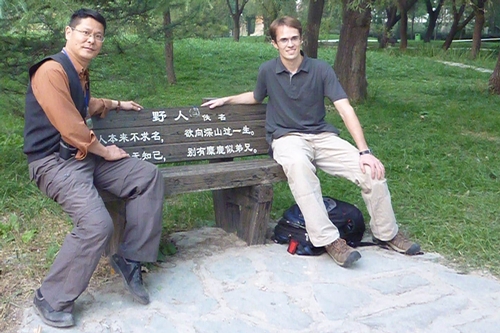Interview with Guo Geng 郭耕
Guo Geng, a curator of Beijing's Elk Park (Milu Yuan 麋鹿苑), is a well-known environmentalist in China. While researching the environmental perspective of the Three Teachings, or sanjiao (三教) - including Confucianism, Buddhism, and Daoism, Telfer was able to interview Mr. Guo on the subject in October of 2010. The following are highlights of the conversation pertaining to Confucianism:
郭耕:“生態文明是中華文明的繼承和昇華。
以儒、釋、道為中心的中華文明歷經數千年,
始終閃耀著生態智慧之光。”
儒家思想以人為本,可是郭老師認為,從儒家
的自然生態觀來看,可以說儒家思想是以“仁”
為本。他認為“仁”一詞具有一種可持續發展的
概念。“仁”代表兩個人,包括當代人和後代
人。郭耕老師認為,保護環境就是保護未來,
也就是保護子孫後代。
“在中國宣傳環保,要從傳統文化的角度來
介入...其實中國儒、釋、道的思想一直在
宣揚要護生息物,普渡眾生,天人合一。
這都是我們老祖宗告訴我們的,所以我們要
走這條路。”
Guo Geng: "Ecological civilization was inherited and refined by Chinese civilization. With Confucianism, Buddhism, and Daoism at its center, Chinese civilization has lived on for thousands of years, constantly glittering with the light of ecological wisdom."
While humanity (ren 人) is at the root of Confucian thought, Guo Geng believes that, from the environmental perspective of Confucianism, it can be said that benevolence (ren 仁) is this root. He believes that the term 'benevolence' contains a concept of sustainable development. The character for 'benevolence' represents two people, in this case one from this generation and one from the next. Guo Geng believes that environmental protection is the same as protection of our future and future generations.
“To promote environmental protection in China, it is important to do so through traditional culture. In fact, Chinese Confucian, Buddhist, and Daoist thought have always advocated the protection of wildlife, delivering all creatures from torment, and the 'unity' of Heaven and humanity. This is all what our ancestors have told us, so we must follow this path.”


